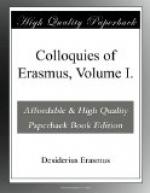Secondly, although in that book I do not teach dogmas of Faith, but formulae for speaking Latin; yet there are matters intermixed by the way, which conduce to good manners. Now if, when a theme has been previously written down in German or French, a master should teach his boys to render the sense in Latin thus: Utinam nihil edant praeter allia, qui nobis hos dies pisculentos invexerunt. ("Would they might eat naught but garlic, who imposed these fish-days upon us.”) Or this: Utinam inedia pereant, qui liberos homines adigunt ac jejunandi necessitatem. ("Would they might starve to death, who force the necessity of fasting on free men.”) Or this: Digni sunt ut fumo pereant qui nobis Dispensationum ad Indulgentiarum fumos tam care vendunt. ("They deserve to be stifled to death who sell us the smokes (pretences) of dispensations and indulgences at so dear a rate.”) Or this: Utinam vere castrentur, qui nolentes arcent a matrimonio. ("Would they might indeed be made eunuchs of, who keep people from marrying, against their will")—I ask, whether he should be forced to defend himself, for having taught how to turn a sentence, though of bad meaning, into good Latin words? I think there is no one so unjust, as to deem this just.
Thirdly, I had in the first instance to take care what sort of person it should be to whom I ascribe the speech in the dialogue. For I do not there represent a divine preaching, but good fellows having a gossip together. Now if any one is so unfair as to refuse to concede me the quality of the person represented, he ought, by the same reasoning, to lay it to my charge, that there one Augustine (I think) disparages the Stoics’ principle of the honestum, and prefers the sect of the Epicureans, who placed the highest good in pleasure. He may also bring it against me, that in that passage a soldier, amongst many things which he speaks about in true soldier-fashion, says that he will look for a priest to confess to, who shall have as little of good as possible about him. The same objector would, I imagine, bring it up against me, were I to ascribe to Arius in a dialogue a discourse at variance with the Church. If such charges against me would be absurd, why in other matters should not regard be had to the quality of the person speaking? Unless perchance, were I to represent a Turk speaking, they should decide to lay at my door whatever he might say.
With this preface, I will make a few general remarks on the passages criticised by the person to whom I refer. In the first passage, a boy of sixteen years says that he confesses only sins that are unquestionably capital, or gravely suspected; while the Lutherans teach, as I understand, that it is not necessary to confess all capital offences. Thus the very facts show, that this boy’s speech is in great disagreement with the dogma which you condemn. Presently, the same boy being asked, whether it be sufficient to




